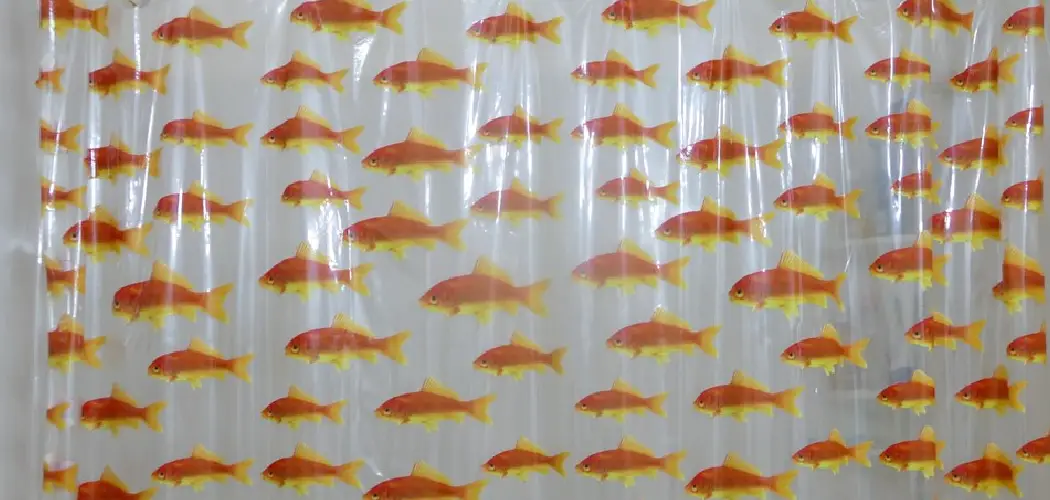Are you revamping your bathroom and considering replacing your glass shower doors? If so, you may wonder how to hang curtains that look great and last. But before you start shopping, it’s essential to ask an often-overlooked question: Are plastic shower curtains recyclable? Considering environmental issues in our decorating choices can help us become more conscious of the actual cost of design–not just what we see at checkout!
Plastic shower curtains have become increasingly popular for their easy-to-maintain and budget-friendly qualities. However, the material used to make plastic shower curtains–polyvinyl chloride (PVC)–is not easily recyclable. This is because PVC is a type of plastic that contains harmful chemicals, making it difficult to recycle and reuse.
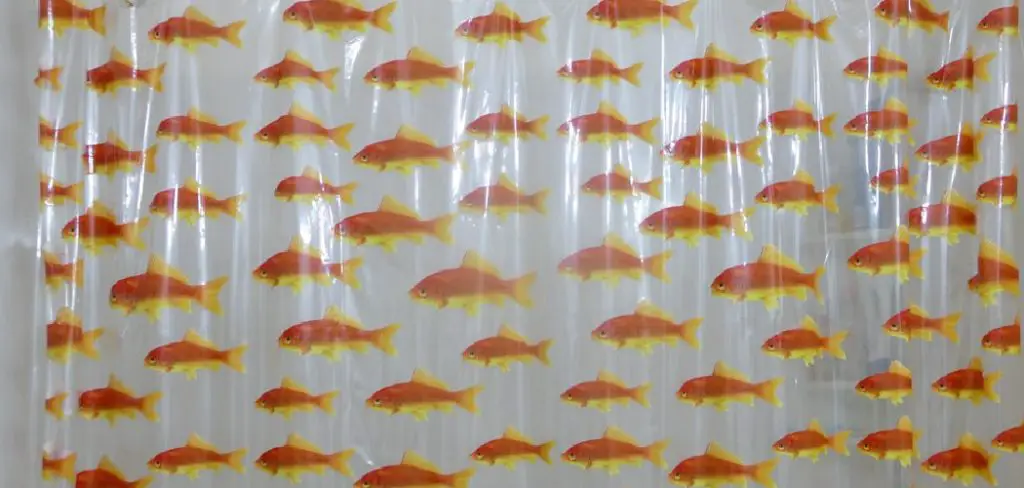
Let’s explore whether plastic shower curtains are eco-friendly enough to consider when remodeling our bathrooms.
Demystifying Plastic: Understanding Shower Curtain Materials
PVC: The Villain
Polyvinyl Chloride, or PVC, is notorious for its non-recyclable nature and the harmful emissions it releases during its production. Apart from environmental concerns, PVC shower curtains can also pose health risks due to the release of volatile organic compounds (VOCs).
PEVA: The Contender
Polyethylene vinyl acetate (PEVA) is a potential alternative, less toxic than PVC and potentially recyclable. However, it’s worth noting that not all recycling facilities accept PEVA, and it still requires petroleum for its production, presenting limitations.
Fabric Curtains: The Sustainable Champions
Fabric shower curtains made from natural materials like hemp or cotton have emerged as sustainable champions. They are readily recyclable and biodegradable but do require a different care regimen compared to their plastic counterparts, including regular washing to prevent mold and mildew build-up.10 Ways on How Can You Tell Are Plastic Shower Curtains Recyclable or Not
1. Check the Label:
Most plastic shower curtains will have a recycling symbol on their packaging, typically including a number indicating the type of plastic used. If the number is “3,” the curtain is made from PVC, which is challenging to recycle. Another sign is if the curtain has a strong chemical smell, often associated with PVC.
2. Contact Your Local Waste Management Facility:
Your local waste management facility will have detailed information on what types of plastic they can process. You can refer to them for guidelines on disposing or recycling your plastic shower curtain. However, due to the complex nature of PVC, many facilities may not accept these curtains.
3. Look for PVC-Free Labels:
If you’re planning to purchase a new curtain, look for one that is labeled as “PVC-free.” These curtains are made from alternative, more eco-friendly materials, such as PEVA or EVA, that are easier to recycle than PVC. Additionally, they are less toxic and better for your health.
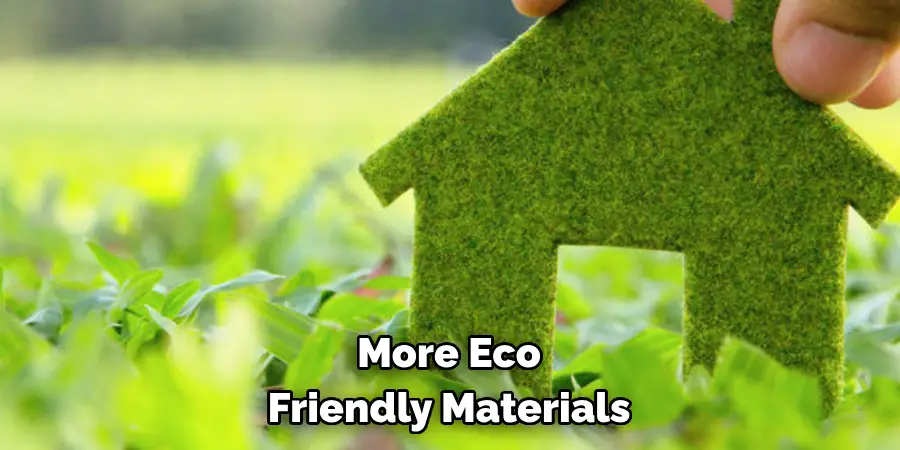
4. Explore Eco-Friendly Alternatives:
Another option is to consider using an eco-friendly alternative to plastic shower curtains, such as hemp or organic cotton. While these options may be more expensive, they are biodegradable and can be composted after use. This eliminates the need for recycling and reduces waste.
5. Reuse or Repurpose:
Instead of throwing out your old plastic curtain, consider ways to reuse or repurpose it. It could be used as a drop cloth for painting, a picnic blanket, or even cut into small squares for patches. By extending the life of the curtain, you are reducing the need for it to be recycled or end up in the landfill. Creativity here can go a long way in promoting sustainability!
6. Donate:
If your shower curtain is still in good condition, consider donating it to a thrift store or a shelter. Others can reuse donated curtains, extending their life cycle and reducing waste. It is a good deed that can positively impact the environment.
7. Buy Recyclable Brands:
Some brands specifically produce shower curtains that are recyclable. When shopping, look for brands that make eco-friendly products. They might be a bit pricier, but they benefit the environment.
8. Contact the Manufacturer:
If you need help determining whether your shower curtain is recyclable, contact the manufacturer directly. They should be able to tell you what material the curtain is made of and whether it can be recycled. Additionally, they may have a take-back program that allows you to return your old curtain for recycling.
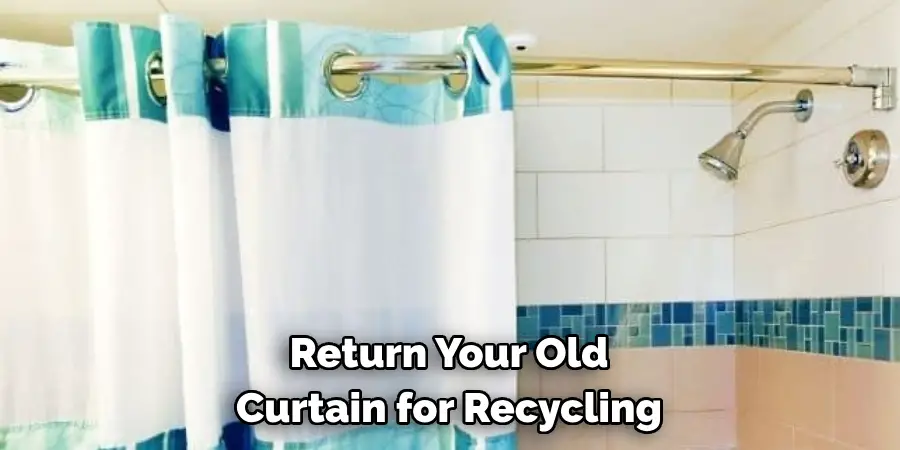
9. Use Recycled Materials:
Look for shower curtains that are made of recycled materials. This not only reduces the demand for new plastic production but also encourages the use of waste as a resource. Check the label for the type of plastic used, as some recycled materials may also contain PVC.
10. Educate Others:
Spread awareness about the importance of using sustainable and recyclable materials daily. By educating others on the harmful effects of PVC and promoting alternatives, we can collectively positively impact the environment. Remember, every small change counts!
By following these tips, you can decide whether plastic shower curtains are recyclable and how to dispose of them properly. As responsible consumers, it is essential to consider the environmental impact of our choices, no matter how small they may seem. Let’s work towards a more sustainable future, one bathroom at a time!
5 Additional Tips and Tricks
Here are five additional tips and tricks regarding the recycling of plastic shower curtains:
- Ensure that the plastic shower curtain is made of recyclable materials. Not all plastic shower curtains are created equal; some may contain a mix of materials, making them non-recyclable.
- When purchasing a new plastic shower curtain, opt for one made from recycled materials. This helps contribute to the circular economy by giving new life to old materials.
- Consider using fabric or cloth shower curtains instead of plastic ones. Fabric shower curtains are not only more environmentally friendly, but they also last longer and can be easily washed and reused.
- If you do have an old plastic shower curtain that cannot be recycled, try repurposing it for other household uses, such as a drop cloth for painting or as a cover for outdoor furniture.
- Avoid using plastic shower curtains by keeping them clean and using a shower liner instead. This not only reduces waste but also saves you money in the long run. Remember that every small change adds up when protecting our planet.
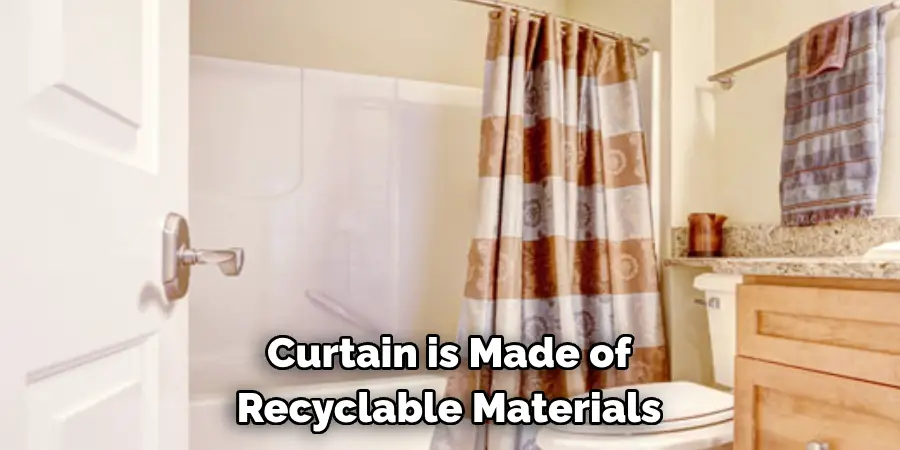
So, are plastic shower curtains recyclable? The answer is yes but with some important considerations.
5 Things You Should Avoid
Here are five things you should avoid when it comes to plastic shower curtains:
- Avoid Buying Non-Recyclable Curtains: Be careful not to purchase plastic shower curtains that are not recyclable. Always check the product description or label for information on its recyclability.
- Refrain from Disposing Curtains Carelessly: Only throw your plastic shower curtains in the trash after attempting to recycle or repurpose them. Improper disposal contributes to landfills and environmental pollution.
- Avoid Overuse and Frequent Replacement: Avoid replacing your plastic shower curtains frequently. Overuse leads to an increase in plastic waste. Instead, maintain your shower curtains well to extend their lifespan.
- Avoid Purchasing Curtains with Harmful Chemicals: Steer clear of shower curtains made of PVC or those containing harmful chemicals like phthalates, as they pose health risks and are usually not recyclable.
- Shun the Practice of Burning Used Curtains: Burning plastic shower curtains can release toxic gases that harm the environment and human health. Always opt for environmentally friendly disposal methods.
By avoiding these practices, you can do your part to reduce plastic shower curtains’ negative impact on our environment. Let’s make conscious choices and work towards a more sustainable future.
Alternatives to plastic shower curtains
1. Fabric Shower Curtains
As mentioned earlier, fabric shower curtains are a great alternative to plastic ones. They are durable and reusable, making them a more environmentally friendly option.
2. Hemp Shower Curtains
Hemp is a sustainable material that is naturally resistant to mold and mildew, making it an excellent alternative to plastic shower curtains.
3. Linen Shower Curtains
Linen is another sustainable material that is also naturally resistant to mold and mildew. It is a great option for eco-conscious individuals.
4. Cotton Shower Curtains
Cotton is a renewable and biodegradable material, making it an excellent choice for those looking for sustainable alternatives to plastic shower curtains.
5. Bamboo Shower Curtains
Bamboo is a highly renewable and fast-growing material that makes for an excellent sustainable option for shower curtains.
6. Glass Shower Doors
Glass shower doors can be a long-lasting and environmentally friendly alternative to plastic shower curtains. They are also easy to clean and maintain.
7. Shower Curtain Liners Made from Biodegradable Materials
If you prefer using a liner for your shower curtains, choose one made from biodegradable materials like hemp, cotton, or bamboo.
8. Shower Curtain Rods and Rings Made with Sustainable Materials
Aside from the curtain itself, consider using sustainable materials for the rod and rings to complete your eco-friendly shower setup.
In conclusion, plastic shower curtains are recyclable but require special processes and facilities.
What is the Difference Between Fabric and Plastic Shower Curtains?
Fabric shower curtains are usually made from natural fibers like cotton or linen or synthetic materials like polyester. They are more durable, easily washed, and reused, making them a better alternative to plastic shower curtains. On the other hand, plastic shower curtains are commonly made from PVC or PEVA, which are non-biodegradable and harmful to the environment. They also tend to tear or mold easily, requiring frequent replacements.
Regarding recyclability, fabric shower curtains have an advantage as they can be recycled with other textiles. Plastic shower curtains, however, require special processes and facilities for recycling due to their composition. Ultimately, choosing a fabric shower curtain over a plastic one benefits the environment and offers practical advantages in terms of durability and recyclability.
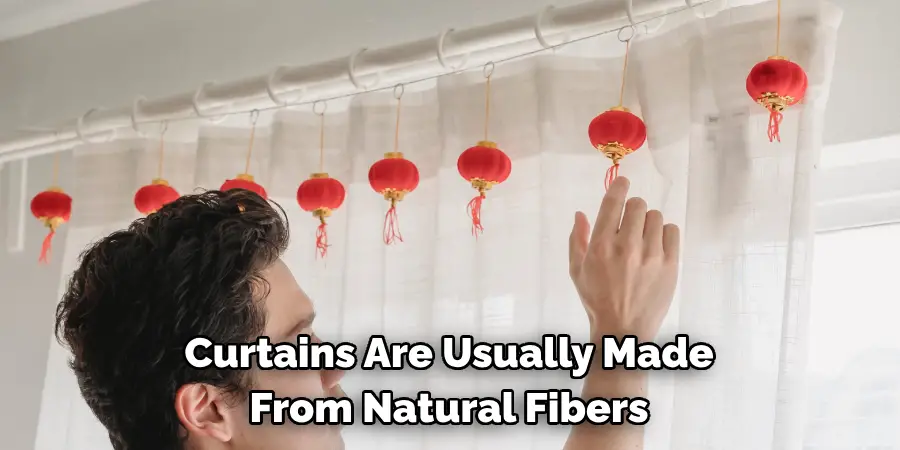
Why Does Your Plastic Shower Curtain Smell?
The unpleasant chemical-like smell often associated with new plastic shower curtains is due to off-gassing. This releases volatile organic compounds (VOCs) from the materials that produce these curtains. These VOCs can harm human health and contribute to indoor air pollution. Opting for fabric shower curtains eliminates this issue as they do not contain harmful chemicals and do not emit strong odors. So, not only are fabric shower curtains better for the environment, but they are also better for your health.
Plastic shower curtains can also develop a musty smell due to mold and mildew growth. This is because they do not allow proper air circulation, trapping moisture inside the shower area. On the other hand, fabric shower curtains are breathable and less likely to develop mold and mildew. Regularly washing fabric shower curtains can also help prevent any unpleasant odors.
Conclusion
To conclude, plastic shower curtains are not readily recyclable as most materials that comprise these curtains cannot be processed properly by recycling facilities. This means that a better option for disposing of your used shower curtain is to repurpose it or donate it so it can be reused again.
You can always search for creative ways to upcycle your curtain, such as turning it into a tablecloth or transforming it into makeshift drop cloths—just with a few punctures in the eyelets, you’ll help create workable sheet fabric. If you don’t anticipate you’ll find a use for your plastic shower curtain again, then consider taking it directly to a waste management facility and speaking to workers there who may know what to do.
Hopefully, the article on are plastic shower curtains recyclable has given you an insight into the impact of plastic shower curtains on our environment and practical solutions for reducing this impact. So, let’s continue to make conscious choices and work towards a healthier planet for ourselves and future generations. Thank you!
You can check it out to Hang Curtains on Windows With Crown Molding

